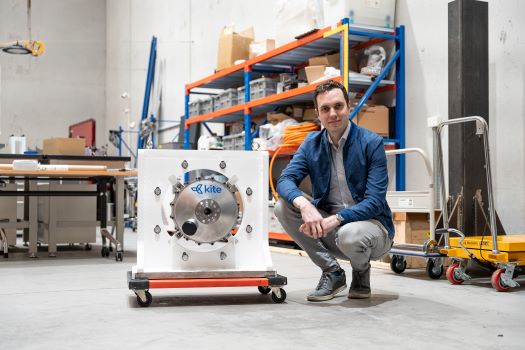Monash University innovation recognised as global contender for Science Start-Up Breakthrough of the Year Award
Kite Magnetics, a Monash University spinout developing ground-breaking electric motor technology, has been shortlisted as one of 25 global ventures to pitch for the Science Breakthrough of the Year Award at the Falling Walls Science Summit in Berlin later this year.
Kite Magnetics is developing the technologies required for the ‘new age’ of electric aviation that is safer, quieter and cheaper to fly further, can carry more and will significantly reduce carbon emissions.
The technology, which is called Aeroperm™, was developed by Monash researchers Professor Kiyonori Suzuki and Dr Richard Parsons from the Faculty of Engineering. Aeroperm™ is a proprietary magnetic material that involves combining novel nanocrystalline magnetic materials with advanced manufacturing methods. It enables electric motors and generators to be significantly lighter and more efficient as Aeroperm™ has an energy loss 10 times smaller than those materials used in conventional electric motors.
The research was commercialised by Monash University through the formation of the spinout company, Kite Magnetics.
Kite Magnetics has been invited to be part of the Falling Walls Science Summit, a leading international, interdisciplinary and intersectoral forum for scientific breakthroughs and science dialogue between global science leaders and society. The Summit takes place every year from 7–9 November in Berlin, commemorating the fall of the Berlin Wall.
Dr Parsons is also the CEO and Founder of Kite Magnetics, and will be at the summit.
“Being selected as one of the 25 winners out of 113 submissions for the Science Breakthrough Of The Year Award at the Falling Walls Science Summit is a tremendous honour,” said Dr Parsons.
“Our team’s dedication to pushing the boundaries of magnetic technology is driven by a shared belief in its power to create a more sustainable world. We are grateful for this opportunity to showcase our innovations on a global stage.”
Monash University Chief Commercialisation Officer, Dr Alastair Hick, highlighted the University’s dedication to driving positive change in the world by translating research to address global challenges.
“Our commitment to commercialisation has played a pivotal role in fostering a talent pool that not only fuels Australian industries but also drives economic growth,” Dr Hick explained.
“This marks the third time a Monash spinout has been chosen as a global finalist in the Falling Walls competition, showcasing our success in turning advanced science into impactful commercial ventures. This achievement underscores our dedication to driving innovation and we look forward to achieving similar milestones into the future.
“Kite Magnetics is another great example of the University’s research commercialisation that aims to address climate change by enabling green aviation through its key technologies.”

